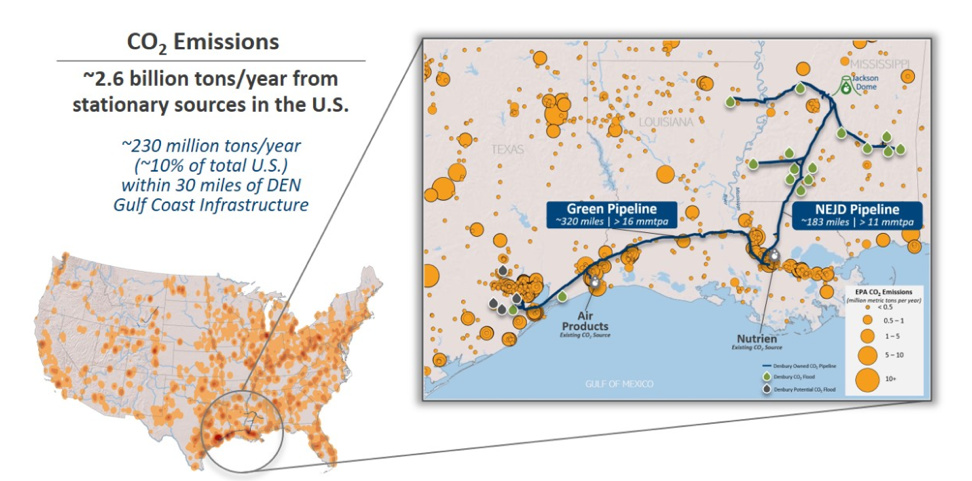
Denbury, with its expertise, would likely add to Exxon Mobil’s CO₂ bandwidth. (Source: rafapress / Shutterstock.com)
Exxon Mobil Corp.’s M&A strategy centers around a pair of all-too-familiar assets: the Permian Basin and Guyana.
So, Exxon Mobil’s recently reported interest in acquiring Denbury Inc., with its operations split between the Rocky Mountains and the U.S. Gulf Coast, might at first seem like a puzzling detour from those prolific production bases. However, at the Energy Intelligence Forum in London last week, John Ardill, vice president and head of global exploration at Exxon Mobil, said the company is continually looking to “prioritize the projects we have coming in.”
Exxon Mobil has indicated interest in divesting in the West Qurna Field in Iraq. Adrill, who formerly served as M&A group head, said that, as he looks that the Middle East broadly, there are discovered, developed and, in some cases, producing resources that are increasing in capacity in scale.
“We’re a molecule-focused company. Our strength is megaproject execution. And so, as we ramp up that CO₂ injection, we’ll be learning from a cost and schedule execution standpoint.”—John Ardill, Exxon Mobil
Still, “we have a finite amount of capacity around the world,” he said. “And so, when we have new projects that come in, that are superior to others—an example is Permian and Guyana—[they] effectively displaced West Qurna from a priority.”
“So, we’re continuously prioritizing,” he continued. “As we bring projects in, if they’re very strong, they will get funded. And to the extent they ultimately don’t compete, we’ll either deprioritize them or divest them.
“And we’ve divested a lot of stuff in the last few years,” he noted.
However, reports that the oil major may be looking to acquire Denbury, reported first by Bloomberg News on Oct. 10, citing unnamed sources, is likely related to Denbury’s expertise related to CO₂ EOR and the emerging CCUS, or carbon capture and storage, industry.
Ardill noted that, in Wyoming, Exxon Mobil injects 6 million to 7 million tonnes of CO₂ per year into its LaBarge project. In February, the company also made a final investment decision to expand carbon capture and storage at the facility, which, according to Exxon Mobil, has “captured more CO₂ than any other facility in the world to date.”
Denbury, with its expertise, would likely add to the company’s CO₂ bandwidth.

Denbury is active in CCUS today, injecting about 3 million metric tons of industrial-sourced CO₂ into EOR fields. The company is also developing a portfolio of projects through Denbury Carbon Solutions with sites in close proximity to its CO₂ pipeline infrastructure.
Headquartered in Plano, Texas, Denbury touts 22 years of experience in transporting, injecting and monitoring CO₂ underground that will aid its customers as well as the “entire CCUS industry,” to ensure the greenhouse gas is permanently stored, according to its website.
Exxon Mobil has expressed preliminary interest in Denbury, but no final decision has been made, the Bloomberg report on Oct. 10 said, adding the oil major could opt against proceeding with a potential deal. Denbury has been reportedly exploring options including a sale, Bloomberg also reported in August.
Denbury did not respond to a request for comment about the possible acquisition.
But Exxon Mobil remains new to CCUS.
Ardill said ExxonMobil still needs to demonstrate that it can capture carbon at scale and “demonstrate [that expertise] to ourselves really from a cost and schedule standpoint.”
“We work very closely along the lines of our strengths. So, we’re a molecule-focused company. Our strength is megaproject execution,” he said. “And so, as we ramp up that CO₂ injection, we’ll be learning from a cost and schedule execution standpoint … and rigorously improving the project, and then making sure that the subsurface works.”
He added that Exxon Mobil has decades of experience taking liquids and gases out of the ground. “This is just putting them back in. So, it’s definitely in our wheelhouse. But we’ll just need to learn.”
Recommended Reading
BPX’s Koontz: The Rise of a Shale Man
2024-07-02 - CEO Kyle Koontz takes the reins of BPX Energy’s rapid onshore growth amid big changes at BP.
Analyst: Is Jerry Jones Making a Run to Take Comstock Private?
2024-09-20 - After buying more than 13.4 million Comstock shares in August, analysts wonder if Dallas Cowboys owner Jerry Jones might split the tackles and run downhill toward a go-private buyout of the Haynesville Shale gas producer.
ONEOK Offers $7B in Notes to Fund EnLink, Medallion Midstream Deals
2024-09-11 - ONEOK intends to use the proceeds to fund its previously announced acquisition of Global Infrastructure Partners’ interest in midstream companies EnLink and Medallion.
Upstream, Midstream Dividends Declared in the Week of July 8, 2024
2024-07-11 - Here is a selection of upstream and midstream dividends declared in the week of July 8.
Dividends Declared in the Week of July 22
2024-07-25 - Second quarter earnings are underway, and companies are declaring dividends.
Comments
Add new comment
This conversation is moderated according to Hart Energy community rules. Please read the rules before joining the discussion. If you’re experiencing any technical problems, please contact our customer care team.






